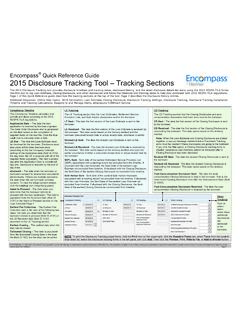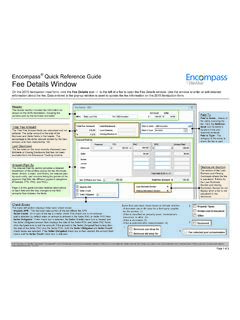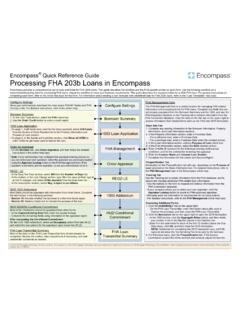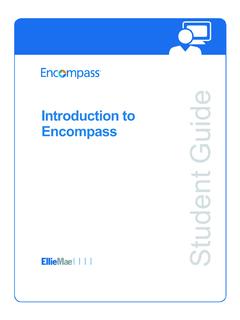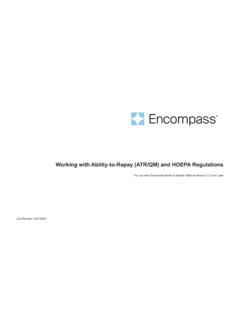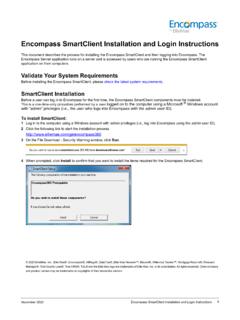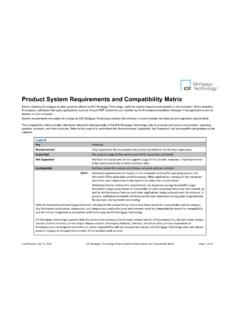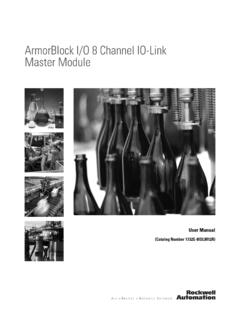Transcription of Advanced Coding for Business Rules - Ellie Mae
1 Advanced Coding for Business Rules 1 June, 2022 Advanced Coding for Business Rules When creating a Business rule in encompass , you can optionally apply conditions under which the rule is applied. If you need to define a condition for a scenario that is not addressed by the pre-defined condition types, you can use the Advanced Coding option to create your own custom expression. In addition to custom Coding for conditions, you can also create custom code within the Milestone Completion, Field Data Entry, Field Triggers, and Loan Form Printing Business Rules . Prerequisites Knowledge of the following will help in creating advance code: Visual Basic.
2 NET Advanced Condition Editor Loan Custom Field Calculations Visual Basic The advance Coding Business rule syntax is built on top of the Visual Basic .NET programming language. Before attempting to author an Advanced Coding rule, it helps to have a good understanding of the syntax and logic flow, as those topics are not covered in this document. Use of MsgBox or other UI-related functions is not supported when writing Advanced code within encompass Business Rules or triggers. These triggers and Rules are enforced for all applications that may use the encompass API, not just the encompass client application. If a non-interactive application were to use the encompass API with these triggers and Rules in place, the application would hang indefinitely since there would be no way to respond.
3 To implement interactive pop-ups and messages, it is recommended that you create those in a plug-in. While this may be a more complicated method, it is a far safer and more robust method. NOTE: Familiarity with the language is assumed throughout the rest of this document. Advanced Condition Editor The Advanced Conditions category of Business Rules provides the Advanced Condition Editor to create expressions to define custom conditions. This tool allows you to create a filter which writes the Visual Basic code for you. Loan Custom Field Calculations The advance Coding Business rule syntax also leverages the capabilities of the encompass Custom Field Calculation engine which provides the ability to create calculations for both pre-defined and user-defined custom field IDs.
4 In addition, the same calculations can be used in various places within the Advanced code. Help with Business Rules Many additional resources are available to help you learn and use Business Rules . encompass Help The online help system provides comprehensive information, including detailed descriptions of Business rule features and tools and step-by-step instructions. Guides and Documents The Guides & Documents contains the latest versions of encompass documentation, including user guides, white papers, and links to quick reference guides and video tutorials. Quick Reference Guide Creating and Using Business Rules 2022 ICE Mortgage Technology. All rights reserved. encompass and the ICE Mortgage Technology logos are trademarks or registered trademarks of ICE Mortgage Technology or its subsidiaries.
5 Other company and product names may be trademarks of their respective owners. Advanced Coding for Business Rules 2 Conditions Business Rules can include a condition under which the rule applies. For example, you can define a rule that applies only if the loan is for a purchase, or only if the subject property is in a particular state. Using conditions, you can define a wide array of Rules that apply to all the different loan scenarios handled by your users. Pre-Defined Conditions To simplify the work of defining conditions, encompass includes a number of pre-defined condition types to allow simple point- and-click selection. You can, for example, define a rule that applies only to loans originated in California by selecting the Property State condition type, and then selecting California from the list provided.
6 The same is the case for conditions based on loan purpose, loan type, loan status, and so on. Advanced Conditions As you build your Business Rules , you may require a rule conditioned upon a field not provided in the pre-defined list, or that involves complex logic based on multiple field values. In these cases, use the Advanced Conditions option to author an expression that defines your custom condition. When Advanced Conditions is selected, a text box appears where you can enter custom logic using Visual Basic .NET or you can enter a loan custom field calculation. The expression must evaluate to a Boolean (true/false) value. If the expression evaluates to true, the rule is applied; otherwise, the rule is ignored.
7 If your expression results in an error of any kind, the rule will not be applied. Advanced Coding for Business Rules 3 In the example below, if the purpose of the loan (field 19) equals Purchase and the numeric value of the purchase price (field 136) is greater than 999999, and the subject property state (field 14) is NY or NJ, then apply this rule. Advanced Condition Editor Instead of typing in the code, you can use the Advanced Condition Editor to write the code for you. 1 Select Advance Conditions as the category type, and then click the Edit Condition icon on the right. 2 Click the New icon to add a new filter. NOTE: If you have existing filters, the New icon places the new filter at the bottom of the list.
8 Select an existing filter and then click the Insert button to insert a new filter above the selected filter. 3 On the Add/Edit Search Filter window: Type a Field to add as a filter. Or, click the Find icon, select a field from the list, and click OK. Or, click the Find icon, type one or more characters in the Find field and then click Find. The first occurrence of the characters in any column are found. Continue clicking Find to view additional occurrences. Select a field from the list, and click OK. 4 Select an Operator, enter (or select) a Value, and then click OK. The Operator and Value define how the field will be used. For example: Field ID = 1109 (Loan Amount), Operator = Greater than, Value = 250000 5 Click OK.
9 6 Repeat steps 2 through 5 to add more filters. 7 To use parentheses to control the order in which multiple filters are evaluated, click Parentheses, select the filters to group, click the New icon, and click OK. 8 Use the AND/OR button to determine how search filters are used together. Advanced Coding for Business Rules 4 9 When finished, click OK. In the example above, the expression evaluates to true if the loan is a refinance and the amount exceeds $250,000. Loan Custom Field Calculations A loan custom field calculation can be used in Advanced Conditions (refer to the "Loan Custom Field Calculations" document) When creating an expression for a Business rule, it must evaluate to a Boolean (true/false) value.
10 The following expression is used to create a rule that is triggered when the loan amount (field 1109) exceeds $500,000. [#1109] > 500000 The following expression enforces the Business rule only if the loan was originated on or after Jan 1, 2010. > #1/1/2010# The field represents the File Started date of the loan and the @ modifier forces encompass to interpret the field value as a Date. The comparison value, #1/1/2010#, is enclosed in # characters to represent a literal date value. Conditions can also involve complex branching using the IIF statement. The following expression causes the rule to be enforced based on differing loan amounts for properties in California versus all other states.

